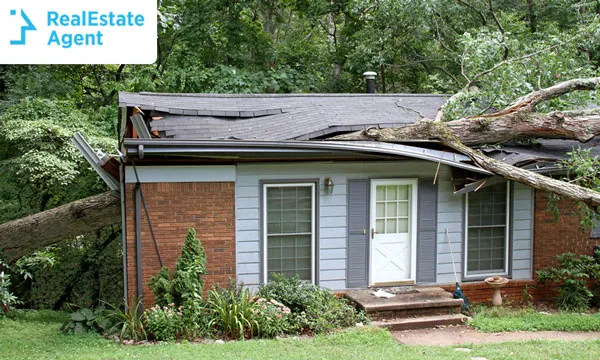
The mind of the real estate investor works with one goal in mind: making a profit. So, with the Atlantic Hurricane Season Coming, the bold real estate investor sees not only a dangerous scenario, but a good opportunity to invest. How is that?, you ask.
Well, imagine a house got damaged by some sort of natural disaster and the Homeowner’s Insurance didn’t cover Acts of God. Being for many different reasons – doesn’t have the money, nor the time or the will to go through a fixer-upper or because he/she wants to get away from that area altogether because you don’t want lightning striking again for a second time (and the funny thing is that this time the phrase can be taken literally) – the homeowner might be inclined to sell the house for a much lower value than what it used to cost prior to whatever act of God happened. The real estate investor, then, becomes a house flipper, renovates the house and sells it to a home buyer at a much higher price than the one he paid for.
You’ve got to give it to them: it’s pretty smart.
However, that can’t exactly be called a niche for house flippers. Ok, we get it that flipping homes is risky by definition, but one thing is to bid on foreclosure auctions and find out the house has structural problems that require new plumbing; the other is (i) finding houses damaged by acts of God, (ii) with homeowners wanting to sell it for cheap and (iii) no major problem that would make the fixer-upper too costly to justify flipping the home. It’s just too many variables to make it something so recurrent as to call it a niche. So, no. Sorry. Not a niche.
But we could do it like the venture capitalists do when they want to single out startups that are really special (valued at over $1 billion) and call those very special houses “unicorns”. Bottom line is that, although they are rare, they do exist and if the real estate investor/house flipper wants to spend his/her time pursuing them there are a couple of things he/she need to be on the lookout.
Secondary Damages
In a way, foreclosure homes are more “sneaky” than houses damaged by acts of God, because while the former is usually closed - and the only way of finding out its major problems is when you come out as the winner in the foreclosure auction – the latter has its flaws pretty much visible. If a tree got struck by lightning and fell down the house destroying the roof and separating the house in halves, there’s no way the home seller will be able to patch or hide that before you see it. Nonetheless, you still have to be on the lookout for secondary damages. That’s the thing about acts of God damages: you start your fixer-upper to repair the ceiling because of the fallen tree, but find out that the lightning that brought the tree down also damaged the power structure of the house, and that will be an extra God knows how many dollars for your budget! There’s a reason why the homeowner’s insurance policies that cover this kind of peril are more expensive.
Try asking the home seller if you can do a Home Inspection. He/She will give arguments contrary to it, being because he needs to do this fast or not do it at all, being because it will be a mess with the family still there in the house… and it’s possibly the truth and not him/her trying to hide something from you. But it’s worth the try and, at the very least, take into consideration that the visible act of God might not be the only damage to the house. Think of the possible secondary damages a hurricane can cause. What about flooding? It can not only ruin all of the furniture and appliances inside the house, but the power structure and even the house foundations. A drought can erode the soil and make it unattractive for that home seller who used to have a farm there, but can also crack the house foundations making it dangerously unsafe, forcing the house flipper to build it from the ground up and now the foreclosure home seems a lot less risky, right? The only safe bet here is that if the act of God in question was a volcano eruption there’s no need to bother for secondary damage as the primary will be enough.
Transparency
All of that might not even matter if you don’t spend time marketing your fixer-upper. Once the prospective home buyer finds out that house’s history – there will be neighbors and there’s always Google – this home buyer might worry about you being a home flipper and question your fixer-upper. They can try to lower the Fair Market Value of the house – or even worse; outright give up on making an offer.
The best advice is being honest with home buyers about what happened to the house, but not only that. Go the extra mile and make transparency your strength. What about a “making of” the whole house flipping project? Show the home buyers everything; even the ugly truth. Invite them to your house flipping process and make them feel a part of it. Document the ups and downs, the struggles and the good moments of it. Try to match the entertainment aspect of a life of a house flipper with the technical information necessary to show how serious the fixer-upper was. If it’s not your forte, hire someone to professionally package these audiovisuals. But, seriously, do it!
If you’re a real estate agent it’s going to do wonders to your real estate branding. Film and post it on social media the whole project as you go. Once it’s all successfully done, one of your viewers might even make an offer to buy the home; who knows? And if you’re not an agent, but an investor: do it anyway. There’s no need to do it “live”, but do film it and document the whole process and produce a little video with photos of before and after to go along with any documentation that proves how the house is safe now and the home buyer is actually paying cheap for the treasure you’re delivering to him.
So, no. Acts of God house flipping is not a thing. But it is a unicorn, and if you come across one: ride it. With care, because its horn might sting, but do ride it.
















Have a question or comment?
We're here to help.